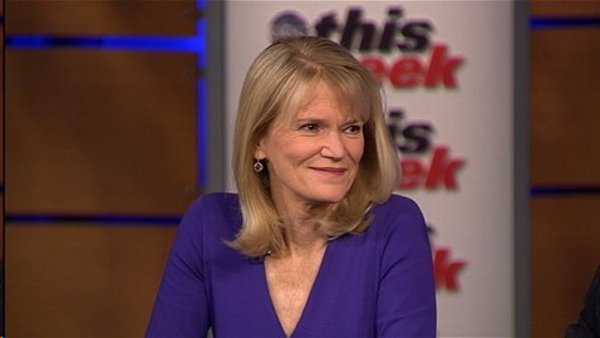V.P. Debate Moderator Flubs Social Security, Medicare Questions

By all accounts among the media’s punditocracy, Thursday night’s Biden-Ryan debate could well have been a slugfest sold on Pay-Per-View. Vice President Joe Biden, the seasoned veteran at age 69—mocking, taunting and not much caring that he’d offend more genteel independents—went toe-to-toe with the greenhorn, Rep. Paul Ryan, aging in at 42 — looking crisp, if a bit corporate, and keeping cool.
From CNN to NPR, the boxing analogies were taking off the gloves. Ryan, goes the verdict, held his own, while Biden won handily (though with no knockdowns) by reenergizing the Democratic base that had been deflated over last week’s dismal showing by the Democrats’ man on the heavyweight card, President Obama.
As the debate’s referee, Martha Raddatz of ABC News is getting high marks almost all around for regaining a modicum of respect for the media, following Jim Lehrer’s limpid performance in the first presidential debate.
What’s being widely missed by the ringside scorekeepers, however, is that while Raddatz is getting a pass for dwelling too much on foreign policy — after all, her colleagues allow, she is a foreign correspondent -- she badly flubbed the portion of the debate devoted to entitlement programs.
Strong on Abortion, Inept on Medicare
That’s no small complaint, considering that the status of Medicare dominated national headlines for over a week after Mitt Romney selected the Wisconsin congressman as his running mate.
On another domestic issue, Raddatz’s tough questioning style is getting credit for throwing Ryan off his otherwise deft footwork when he hesitated at her pointed question on abortion and religion. He seemed to suggest that a Romney-Ryan administration would aggressively pursue anti-abortion policies. That will likely force the GOP campaign to more bobbing and weaving than they’d like in the coming days in hopes of not further alienating the critical women’s vote.
On Medicare and entitlements, though, Raddatz was as inept and ill-informed as an NFL replacement referee. (To defend the mixed sports metaphor, those amateur football officials last month wouldn’t have been any better scoring a boxing match.)
Raddatz began the segment asking, "Both Medicare and Social Security are going broke and taking a larger share of the budget in the process. Will benefits for Americans under these programs have to change for the programs to survive, Mr. Ryan?"
It’s like asking, “Are old people still beating up on their children and grandchildren’s generation?”
Ryan took his opening for a clear shot at the senior solar plexus, answering, “Absolutely, Medicare and Social Security are going bankrupt. These are indisputable facts.”
But among the undisputed national experts on Medicare, Yale emeritus professor Theodore R. Marmor—also a critic of many aspects of Obamacare—is among many authorities who emphasize that reducing the cost of Medicare (and Medicaid) requires tackling “the real problem of rising health care costs with sensible cost controls.”
Such health care cost controls are practiced in most other advanced economies around the globe, which spend half of what the United States does, and with better health care outcomes.
A better-prepared moderator could have focused the debate on overall health care inflation in the country, and the extent to which the Affordable Care Act (ACA)/Obamacare will or won’t control spending.
Instead the vice-president and his challenger bickered over whether the Romney-Ryan plan calls for “premium support” or “vouchers,” or whether Obamacare is taking $716 billion from Medicare over 10 years to cover non-seniors, or would, as Biden asserted, come from greater efficiency imposed on insurance companies and providers.
(Oddly, like President Obama last week, Biden missed the chance to counter that Ryan’s original proposal included the same $716 billion, but would have taken it out of people’s benefits.)

Critical to Women of Color, Others at Risk
Joe Baker, president of the Medicare Rights Center, said, “Raddatz characterization of Medicare ‘as going broke’ is misleading and unhelpful. Medicare is not in crisis.”
Jeanette Takamura, who headed the U.S. Administration on Aging in the second Clinton administration, said in an e-mail, “It feels like the media is inclined to portray both programs as nearly bankrupt. There is a lot of misrepresentation of the programs in general that seems to be difficult to turn around.”
Now dean of Columbia University’s School of Social Work, Takamura stressed that most Americans remain unaware of how critical the programs are for “populations at risk of impoverishment. Older women, particularly single women, living alone, and women of color, would be in greater jeopardy if not for their Social Security benefits.”
Regarding Social Security’s finances, the program’s most recent trustees report shows that there is currently $2.7 trillion in the surplus fund created as a cushion to help the extra large boomer population retire while reducing the burden on their much small children’s generation. That surplus fund will about another trillion before the system begins to spend the account down. It was originally a financial booster shot that the govermnet thought should be added (including a payroll tax increase so boomers would pay a bit extra for their retirement) and then used up as they retire.
That is, today's seniors really did pay for your own Social Security. The system's actuaries -- think of them as the nations number one stistical nerds--had the figures pretty close to what they were--except for one.
You likely don't know--which is why Martha Raddatz was supposed to find out for you and pose an honest question--that the number crunchers and policy wonks decided that to pay workers a modest pension securely over 75 years--just to be safe--they would need to apply the payroll tax to 90 percent of all American income the calculated would earned over that period.
The rich could keep 10 percent of annual U.S. earned wages, said the logic, so they would not feel gouged and would continue supporting the system politically.
That's why the payroll tax today is applied to only the first $110,200 (it goes up slightly with inflation each year). So someone earning $1 million doesn't pay into Social Security for $889,800 of that money. This was the deal struck by Ronald Reagan's vaunted Greenspan Commission back in 1983 to save Social Security.
The 1 Percent and 47 Percent
What the actuaries and politicians of 30 years ago did not count on was that very wealthy people would suck up far more of overall U.S. wealth after that--you know, the 1 percent--while ordinary Joes and Janes (Mitt Romney's 47 percent) saw their wages stagnate.
Today, using the old formula, Social Security taxes only 83 percent of U.S. Income. So by bringing the level back up to 90 percent--such as by taxing some income above that $110,200--would do a lot to restore that shortfall. Unfortunately, both Republicans and many powerful Democrats would rather cut average benefits and raise the full Social Security retirement age, which also amounts to a big cut.
Oh, and did I mention that because it is a closed pay-in/pay-out system--Social Security doesn't add a penny to the National Debt. When conservative politicians and columnists of both parties say Social Security's trust fund (the big surplus) is just a bunch of IOUs, ask yourself why the same people and their bailed-out banks still recommend U.S. treasuries as the safest investments in the world.
So referring to the program as nearly “bankrupt” is absurd. Nancy Altman, author of The Battle for Social Security and co-founder of the advocacy group Social Security Works, calls the program “the poster child for fiscal responsibility.” The program is prudently managed, cost-effective and carefully monitored.
There are dozens of respected experts like Altman in Washington, D.C., who could have offered a more diligent journalist a more temperate perspective. Raddatz may personally believe opinions to the contrary, but she failed the public and failed journalism by loading her views (or poor understanding of the issues) into questions for men vying to be a heartbeat away from the presidency. By the way, back in 1983, Altman was Alan Greenspan's assistant on the famous commission. So knows a thing or three about the program.
Joe Baker of the Medicare Rights Center commented, “Raddatz’s question feeds into fears among younger Americans that Medicare will not be there for them. It is hyperbole and it is irresponsible, partly because it reinforces much of the fear mongering that is problematic about the national dialogue related to the deficit in general and, most recently, the fiscal cliff.”
Readers can find a thorough new comparison of Obamacare with the Romney-Ryan health care plan on the website of the Commonwealth Fund.
Excellent nonpartisan fact sheets (the kind not laundered with a spin cycle) on both Social Security and Medicare are posted by the National Academy for Social Insurance.
Photos: New America Media; ABC News.




























































































































































































































































































































